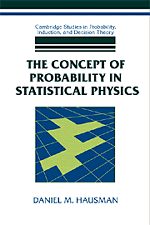Book contents
- Frontmatter
- Contents
- Introduction
- Chapter 1 The Neo-Laplacian Approach to Statistical Mechanics
- Chapter 2 Subjectivism and the Ergodic Approach
- Chapter 3 The Haar Measure
- Chapter 4 Measure and Topology in Statistical Mechanics
- Chapter 5 Three Solutions
- Appendix I Mathematical Preliminaries
- Appendix II On the Foundations of Probability
- Appendix III Probability in Nonequilibrium Statistical Mechanics
- Author Index
- Subject Index
Appendix III - Probability in Nonequilibrium Statistical Mechanics
Published online by Cambridge University Press: 12 November 2009
- Frontmatter
- Contents
- Introduction
- Chapter 1 The Neo-Laplacian Approach to Statistical Mechanics
- Chapter 2 Subjectivism and the Ergodic Approach
- Chapter 3 The Haar Measure
- Chapter 4 Measure and Topology in Statistical Mechanics
- Chapter 5 Three Solutions
- Appendix I Mathematical Preliminaries
- Appendix II On the Foundations of Probability
- Appendix III Probability in Nonequilibrium Statistical Mechanics
- Author Index
- Subject Index
Summary
IS THE PROBABILISTIC FRAMEWORK OF EQUILIBRIUM SM TOO RESRICTIVE?
The main objective of this book has been to analyze the concept of probability as it is defined and used in the context of statistical mechanics. Other topics that arise in the discussion on the foundations of statistical mechanics have been given much less attention and emphasis. A case in point is nonequilibrium statistical mechanics (henceforth NESM) in general and the issue of irreversility in particular. These issues are, no doubt, extremely important, so much so that, from certain points of view, most of the nontrivial aspects of statistical mechanics necessitate the introduction of the framework of NESM. What distinguishes this framework, some writers maintain, is the presence of time-dependent probabilities.
In this appendix we shall argue that the concept of probability in NESM is still ill understood. We maintain that those aspects of NESM that can be given a coherent and rigorous treatment can be discussed in a framework that is only a slight generalization of the framework of equilibrium statistical mechanics. Conversely, those aspects of NESM that transcend the equilibrium framework do not have, as of yet, secure foundations. The main object of our discussion will be the conception of NESM that was developed by the so-called Brussels school. We shall argue that the beautiful conceptual analysis of NESM that the members of this school developed do not yield, at present, a substantial generalization of the framework of equilibrium statistical mechanics.
- Type
- Chapter
- Information
- The Concept of Probability in Statistical Physics , pp. 245 - 258Publisher: Cambridge University PressPrint publication year: 1999



